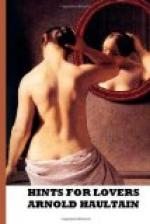Never expect an angel to act as a charwoman; the sweeping must be done by the owner. Lastly,
Unless each heart is permitted access to the other, their union is fictitious, perhaps perilous.—Explain these tropes who can.
* * *
No man can tell to whom a woman’s heart belongs; not even the man who calls the woman “his”. And
Let no man imagine that when he has won him a woman, he has won him a woman’s heart. Since,
Sometimes a woman will give her heart to one man and her troth to another. Besides,
Many a heart is hard to read—especially if it is a palimpsest. Indeed, many are illegible to their owners. Nevertheless, That the woman should not know her own heart (as so often happens) terrifies the woman as much as it exasperates the man. Yet,
That must be a curious love that causes the heart to hesitate. And yet,
Many a man has debated for months whether to propose or not; and sometimes a woman will accept on a Friday the man that she refused point-blank of a Tuesday. But perhaps,
Where the heart hesitates, it is not so much a case of love as a case of convenience. For,
An overwhelming love leaves the heart of either doubt or debate. But alas,
The human heart seems to be an anatomical engine of such intricate and delicate mechanism that its workings are uncontrollable even by its owner.
Is a constant heart as hard a thing to manufacture in the world of life as is an immobile thing in the world of matter? And matter, so they say, is immobile only at absolute zero—when bereft of even molecular motion: a thing impossible to produce, and which to produce would require incalculable pressure and almost incalculable cold.
(Is there no chemical formula for fixing the impression of the heart?)
Who really held Burns his heart in thrall, Nelly Fitzpatrick or Mary Campbell or Ellison Begbie or Margaret Chalmers or Charlotte Hamilton or Jenny Cruikshank or Anne Park or Jean Armour or Mrs. Whelpdale or Mrs. Agnes McLehose? and who the heart of Goethe,—Gretchen or Kitty Shonkopf or Frederica Brion or Charlotte Buff or Lily Shonemann or the Countess Augusta or Charlotte van Stein or Bettina Brentano or Mariana von Willemer—or his wife, Christina Vulpius?
However, whether it is a provision of Nature, or whether it is due to the perversity of Man, probably the feminine heart is far more constant than the masculine, and perhaps any one of Goethe’s or of Burns his inamoratas would have clung to him had he been faithful to her. And yet,




